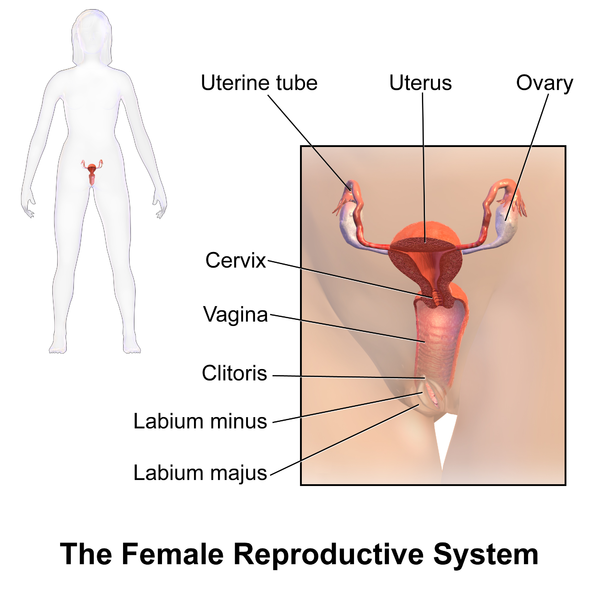The Organ Systems/reproductive
The Reproductive System
Function of System:
The function of the FEMALE Reproductive System is to first, produce female eggs called oocytes. The oocytes are then transported to the uterine tubes where they are fertilized by a male's sperm. The fertilized egg then moves to the uterus where it implants into the thickened uterine lining and continues developing into an embryo. Over the course of nine months, the embryo matures into a fetus and then is born as a new baby. When a woman is not pregnant, the uterus continues to produce the uterine lining. If the uterus goes one month without being implanted with an egg, it must shed the lining to produce more. This shed linning is excreted out of the vagina in a process called menstruation or a period. The period can last up to a week and can cause pain as muscles are contracted to push out the lining.
The function of the MALE Reproductive System is to produce, maintains, and transport sperm, that along with a protective fluid makes semen. The male then discharges the sperm within a female to initiate fertilization. The male reproductive system also produces and secretes testosterone.
How it aids in homeostasis:
The Reproductive System doesn't do much to aid in the homeostasis of an organism; instead, it aids in the maintenance of the species itself. However, sex hormones do affect organs in the body. If there is a hormone imbalance in the body, it may lead to various disorders.
Image of system:
Name and function of Major Organs:
MALE: Penis, Scrotum, Seminal Vesicles, and Prostate
FEMALE: (EXTERNAL): Labium Minora and Majora, Vagina, and Clitoris
(INTERNAL): Uterus, Ovaries, Cervix, and Fallopian Tubes.
Comparative anatomy:
Frog Reproductive System: The female lays hundreds of unfertilized eggs and the male ejaculates on them to fertilize them outside of the body.
Fish Sex Organs: For most species, both fish release their gametes into the water in hopes that a majority will end up fertilized.
Snake Sex Organs: The male snake uses two sex organs called hemipenis to insert sperm into the female. The female stores the sperm for up to five years in two pockets. If she has multiple mates, she can choose whose sperm is used to fertilize the eggs.
FAQ:
Q: What are wet dreams?
A: When a person has a dream that is sexually stimulating, they can ejaculate in their sleep.
Q: How soon after you have sex does a woman find out she's pregnant?
A: The earliest sign of pregnancy is not having your period, but some pregnancy tests can detect the body’s change in hormones as early as one week after sex.
Q: Where does fertilization occur?
A: The sperm fertilizes the egg in the uterine tubes.
Q: Why do some mammals like humans keep their full breasts their whole adulthood, while other mammals like dogs only grow them during pregnancy?
A: Scientists aren’t sure, but the accepted theory is humans evolved to keep their full breasts to attract mates. This signals to the male that the female is ready to reproduce even though the breasts do not function until pregnancy.
Q: Why are some people not able to reproduce?
A: Men can be unable to produce fertile sperm due to illness, injury, or other medical conditions. Women can be unable to produce fertile eggs due to hormone imbalances or damage to the uterus.
Reference sources (APA):
Female reproductive anatomy. (n.d.). Retrieved April 13, 2017, from https://medlineplus.gov/ency/imagepages/1112.htm
Male reproductive anatomy. (n.d.). Retrieved April 13, 2017, from https://medlineplus.gov/ency/imagepages.1113.htm
Male Reproductive System Information. (n.d.). Retrieved April 13, 2017, from https://my.clevelandclinic.org/health/articles/the-male-reproductive-system
The Female Reproductive System. (n.d.). Retrieved April 13, 2017, from https://my.clevelandclinic.org/health/articles/the-female-reproductive-system
Foundation, C. (2014, April 29). 19.2: Homeostasis and Regulation. Retrieved April 13, 2017, from http://www.ck12.org/book/CK-12-Biology-I-Honors-CA-DTI3/section/19.2/
Frog Reproductive system. Retrieved April 17, 2017 , from https://unstanimalbehavior.files.wordpress.com/2014/04/justin-1.jpg
Fish Reproductive system. Retrieved April 17, 2017 , from www.tilapia-farming.com/wp-content/uploads/2013/02/tilapia_sexing1.jpg
Snake Reproductive system. Retrieved April 17, 2017 , from Californiaredsidedgartersnake.weebly.com/uploads/2/6/6/7/26675537/8650974_orig.jpg
Wilson, T. V. (2008, February 5). How Frogs Work. Retrieved April 27, 2020, from https:/ /animals.howstuffworks.com/amphibians/frog4.htm
Markgraf, B. (2019, November 22). The Reproductive System of Fish. Retrieved April 27, 2020, from https:/ /sciencing.com/reproductive-system-fish-6725214.html
Moloney, A. (2019, December 12). How do snakes mate? The world of snake sex explained. Retrieved April 27, 2020, from https:/ /metro.co.uk/2017/06/29/how-do-snakes-mate-the-world-of-snake-sex-explained-6741379/
Binns, C. (2010, August 5). Why Do Women Have Breasts? Retrieved April 27, 2020, from https:/ /www.livescience.com/32745-why-do-women-have-breasts.html
Office on Women’s Health. (2019, April 1). Infertility. Retrieved April 27, 2020, from https:/ /www.womenshealth.gov/a-z-topics/infertility
Return to Table of Contents



